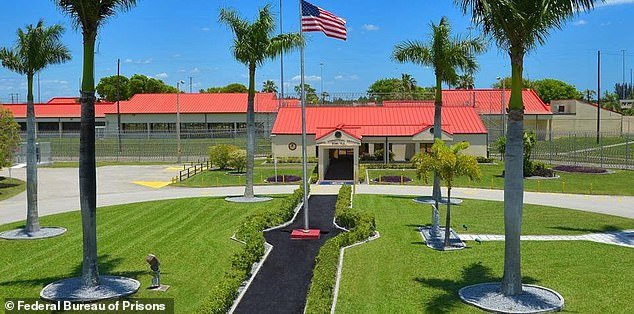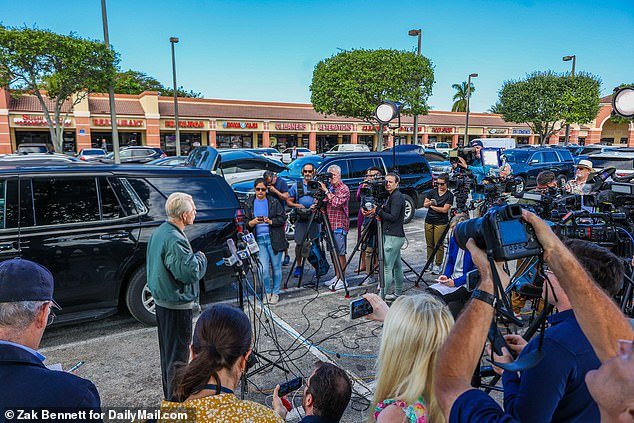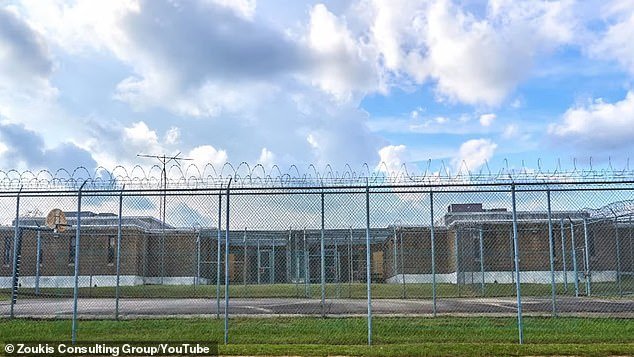Former Trump aide Peter Navarro reported to prison Tuesday, saying his prison sentence represented a “crippling blow” to America’s principle of separation of powers.
Navarro, 74, served as a trade adviser during Trump’s presidency and is the first senior official in his administration to be imprisoned in connection with his efforts to overturn the results of the 2020 election.
He told reporters gathered in a parking lot across the street from the Miami Federal Correctional Institution that he would serve his sentence “proudly.”
“When I enter this prison today,” he said, “the justice system as it exists will have dealt a crippling blow to the constitutional separation of powers and executive privilege.”
The setting, outside a shopping center next to a Shell gas station, was an unremarkable backdrop for such a provocative speech and a man who, as a White House trade adviser, was once a regular at the Oval Office.

Peter Navarro ditched his usual navy suit for casual clothes and spoke to reporters outside a strip mall in Miami, across the street from the federal prison where he was scheduled to report Tuesday.


Navarro is expected to serve four months at the Federal Correctional Institution in Miami
It reminded me of Rudi Giuliani’s press conference outside the Four Seasons Total Landscaping lot outside Philadelphia a few days after the 2020 election.
Navarro dressed for the role, swapping his usual uniform of a red tie and navy suit for a bomber jacket and black t-shirt.
He will serve a four-month sentence after being convicted of two counts of contempt of Congress.
Navarro has refused to cooperate with the House investigation into the Jan. 6 assault on the U.S. Capitol, citing “executive privilege.”
However, courts up to the Supreme Court have rejected this argument, saying there is no evidence that Trump ever invoked the privilege.
On Tuesday, he said he would draw strength from his time indoors.
“I will walk there proudly to do my time,” he said. “I will draw strength from this: Donald John Trump is the candidate.”
After Trump’s loss to Joe Biden, Navarro became a strong believer in conspiracy theories that the election was stolen.
He collected files to support his claims with titles such as “The Art of Stealing” and “Immaculate Deception.”


Navarro told reporters he would “proudly walk in there to do my time” Monday morning


Navarro compiled his own files alleging widespread election fraud after Trump’s defeat


Navarro was President Donald Trump’s trade adviser. They are seen together in 2020 examining an all-electric pickup truck on the South Lawn of the White House.
As he prepares to go to prison, he returns to one of his favorite themes.
“The second story, related to this one, has to do with the emergence of the war of rights and the partisan militarization of our justice system, which we have seen come to this country with a vengeance since the arrival of Donald John Trump for the presidency,” he said.
“And it just keeps getting worse.”
Navarro was the second Trump aide convicted of the congressional charges.
Former White House chief strategist Steve Bannon also refused to comply with a subpoena and was sentenced to four months in prison, but he remains free while he appeals.


FCI Miami is a low-security U.S. federal prison for male inmates in Florida


Current and former detainees among its lush green lawns and palm trees include Panama’s former dictator Manuel Noriega.


The mundane setting recalls Rudi Giuliani’s press conference outside the Four Seasons Total Landscaping grounds outside Philadelphia days after the 2020 election.
Navarro’s last hope lay in the Supreme Court.
But on Monday, Supreme Court Chief Justice John Roberts, who handles emergency requests from Washington, D.C., said he had “no reason to disagree” with the lower courts who had decided that there was no reason to suspend the sentence. with the decision of the court of appeal.
FCI Miami is a low security prison for men.
Current or former inmates held amid its lush green lawns and palm trees include Panama’s former dictator Manuel Noriega, Bill Campbell, the former Atlanta mayor who served two years after being convicted of escape tax, and Joel Greenberg, the representative’s partner. Matt Gaetz, convicted of sex trafficking, identity theft and wire fraud.
